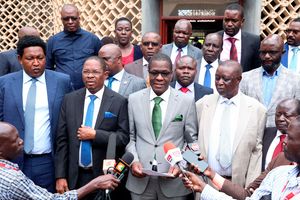Kenya-China cooperation can only get better in 2024

President William Ruto and First Lady Rachel Ruto are received at the Great Hall of the People during a State banquet hosted by President Xi Jinping for visiting Heads of State and government in Beijing, China, on October 17, 2023.
Sixty years after formalising relations, Kenya-China diplomatic ties is today one of the most dynamic in Africa. Nairobi is among a handful of African countries that currently maintain a comprehensive strategic cooperative partnership with Beijing.
China is Kenya’s largest trade partner, top source of development financing, and leading destination for young Kenyans seeking higher education abroad. On the other hand, Kenya has become a strategic gateway for China into Africa, hosting the landing node for President Xi Jinping’s landmark Belt and Road Initiative (BRI).
This year, several activities and diplomatic events headlined the deepening development cooperation between China and Kenya. President William Ruto was in Beijing in October in a first state visit as Kenyan leader. The visit provided the host, President Xi Jinping and the Kenyan leader an opportunity to discuss areas of collaboration with mutual impacts on joint development.
While in Beijing President Ruto also participated in the Belt and Road Forum, commemorating ten years since BRI was rolled out by China. As the foremost platform for international development cooperation, BRI has seen Kenya implement a number of infrastructure projects. They include the Mombasa-Nairobi-Naivasha standard gauge railway, the Nairobi Expressway, Konza Technopolis, Thwake dam, Lamu port and Global Trade Centre.
President Ruto not only acknowledged the contribution of China to Kenya’s development but also sought to open new frontiers of cooperation – pushing for more Kenyan exports to China. In the last two years, Kenyan fresh avocados and anchovies (omena) gained entry into the Chinese market. By leverage the green lanes initiative, Nairobi could see more unique and high-quality products retail in Chinese consumer stores.
Still, at the BRI forum, President Ruto participated in the Kenya-China investors roundtable where investment commitments in excess of US$ 4.32 billion were reached in favour of Kenya.
Last month, China Trade Week was staged in Nairobi, bringing together private sector players from Kenya and China. The event saw business matchmaking between enterprises in key sectors such as construction, agriculture, food, and technology.
In a bid to attract Chinese tourists, Kenya undertook an aggressive marketing of its pristine tourism products in the Chinese cities of Beijing, Shanghai and Guangzhou. The government aims to increase annual Chinese arrivals from the current 50,000 to about 300,000. China is currently the largest tourist source market in the world.
2023 also witnessed close political consultations between Kenya and China with senior officials from both sides regularly visiting. The Kiswahili version of President Xi Jinping’s Book, Governance of China was also unveiled in Nairobi this year, signifying heightened public diplomacy, aimed at helping Kiswahili-speaking communities to better understand China.
China is an important international development partner for Kenya. Nairobi should continue to harness the potential of China-fronted development platforms such as BRI, Global Development Initiative and Global Security Initiative. On the other hand, Kenya offers China access to wider markets in Africa, a political voice in the continent and a platform for Chinese companies to internationalise.
Building on the gains made during President Ruto’s October visit to China, the strong tradition of friendship and comprehensive diplomatic ties, both countries should make 2024 count for more tangible and impactful development programmes.
Dr Cavince, PhD, is a scholar of international relations with a focus on China-Africa development cooperation. Cavinceworld





